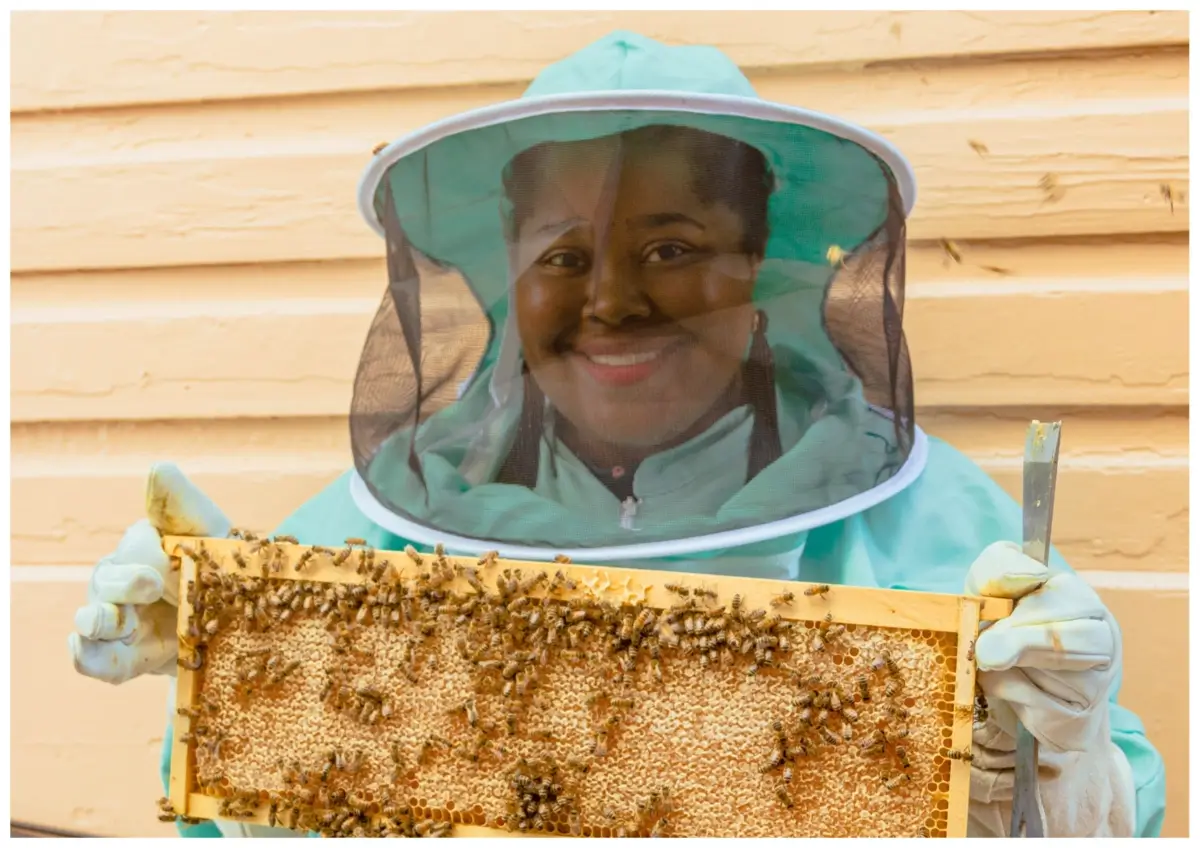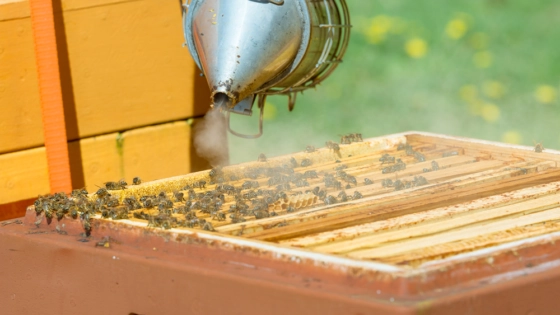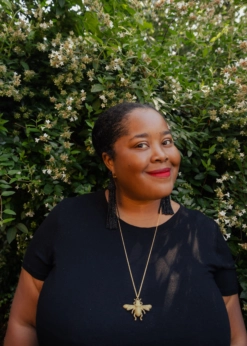Meet the Urban Apiarist Creating Community for Black Beekeepers
Karyn Bigelow’s Beekeeping while Black project aims to connect and support Black beekeepers, who may face unique challenges in their work.
Meet the Urban Apiarist Creating Community for Black Beekeepers
Karyn Bigelow’s Beekeeping while Black project aims to connect and support Black beekeepers, who may face unique challenges in their work.

Karyn Bigelow is the creator of Beekeeping While Black.courtesy Karyn Bigelow.
With a background in food policy and environmental causes, Karyn Bigelow already understood how vital bees are to the environment. But the isolation during 2020 sent her on a path to help diversify the apiary world and create Beekeeping While Black, an online community to educate and support African Americans who keep bees.
As her area was on lockdown during the pandemic, Bigelow gravitated towards an old hobby from her childhood: playing The Sims computer game. Remembering that it used to take her hours to complete, she thought it was a good way to pass the empty hours. One of the tasks in The Sims Four is keeping a virtual bee box. This got Bigelow interested in real-world beekeeping, leading her to take an online beekeeping course.
The class got her thinking about how, as a Black person, she might have to be more cautious in certain situations than her non-Black counterparts and how some parts of beekeeping were challenging in ways some might not have considered.
While there are no current numbers on how many African American beekeepers exist in the United States, the history of Black Americans farming, and even beekeeping, runs deep. There are letters from George Washington indicating that people he enslaved kept hives to provide Mount Vernon with honey. And at one time, all students at the historic Black college Tuskeegee University in Alabama were required to take beekeeping classes.
But today, according to the United States Department of Agriculture, less than one percent of farmers identify as African American. Compare the 45,000 Black farmers today to the almost 950,000 that existed 100 years ago in the United States. This decline also includes a decrease in rural land owned by African Americans, which profoundly impacts access to beekeeping.
Living in a condo in Washington, D.C., Bigelow doesn’t have access to her own land and worked with the DC Beekeepers Alliance, which connects apiarists in the city with those willing to host a hive on their private property. But as Bigelow contemplated this, other thoughts came to mind.
“I found myself … asking myself questions that I knew no one else in the class was having to ask, or at least my non-Black counterparts,” she says. “As somebody who wasn’t attached to an organization or did not have my own backyard to be able to put a hive, I found myself struggling and asking myself questions about where did I feel safe. Because at that point it was early 2021. So, my mind was still very much on a lot of the conversations that [had] been happening, especially in the summer of 2020.”
As Bigelow thought about beekeeping, she realized that her safety as an African American could be jeopardized as she went onto other people’s properties to tend her hives. Her mind kept going back to other Black Americans in the news who had done perfectly legal things in public but still had the police called on them.
“It made me uncomfortable to actually be in a public space at that point and to feel safe,” says Bigelow. “If I go on someone’s private property, my assumption was that most of the people who would be willing to host would probably not look like me. Then there’s also the conversation of if I’ll be safe going into someone’s private property, with permission, but nervous if their neighbors would try to call the cops.”
The lack of land and the decline of African American farmers also pose another issue: finding mentors who can guide others through Black beekeepers’ unique challenges. Mentoring in the beekeeping community is very important because beekeeping is like farming, says Bigelow. It’s not an exact science and novices can’t learn everything from a book. There’s a lot of hands-on experience that needs to take place. Having someone to walk a new beekeeper through issues is imperative to the learning process.
Bigelow discovered one such issue in her training while using a smoker, an essential tool used to calm agitated bees.
“As I started beekeeping, I realized that using a smoker, which is a common practice of beekeeping, isn’t great for a person who can’t wash their hair every time they use one,” she says, referring to the fact that African American hair tends to be dry and isn’t shampooed daily to help reduce breakage. “And so, I found myself encountering beekeeping in a way that very much, you know, dealt with my lived experience as a Black woman, whether that comes to my literal body or my fears or concerns for the safety of my body.”

Beekeeping While Black is Bigelow’s way of creating a community while also helping provide mentorship and inspiration to African Americans considering taking up this unique skill.
Currently, the website houses The Honey Book, a directory of Black beekeepers in the United States. While it’s not a comprehensive list, Bigelow happily adds new beekeepers who contact her via the website or the site’s Instagram account. Future plans include a mentor matching program, along with hopefully one day taking up research and policy goals that influence beekeeping and the avenues associated with it.
Since Bigelow doesn’t currently have access to additional land, she can only maintain one hive. But that, or the fact that she has a full-time job outside of beekeeping, doesn’t deter her from supporting others.
“What I want people to know about Beekeeping While Black is that this is a space to create community. It’s a place where Black beekeepers can get the support that they need and to be able to feel seen,” she says. “I want it to be a place where we can have the conversations that many of us feel like we don’t get to have.”
As a relatively new beekeeper, Bigelow says she still has a lot to learn from others. “I see it as a journey of being able to [provide] resources to people to the best of my ability, but . . . also being able to bring beekeepers together so that we can learn and co-create together.”

Bigelow’s background also helped enhance her view of how diversity can bring a new light to an age-old craft.
“I think [diversity in beekeeping] is also really important because we need to move towards a food system that is more sustainable. And I can say anecdotally I find that Black and brown beekeepers tend to have more sustainable practices. So, I think it’s important. I really feel like some education can be had where farmers from different backgrounds are able to learn from each other, and that includes with beekeeping.”
Bigelow hopes she’s created an online place for Black people to find content and community with others who also have a passion for keeping bees. While she knows that in-person mentorship is important, she believes that having an online support system is important, too. As Bigelow continues developing the website (there are hopes for an incubator program one day), she knows that the art of beekeeping can help people in many ways.
“I have learned so much about life watching the bees. And one of those things that I’ve learned is about the beauty and community when the community is focused on the same mission. No one bee is more important than the other or their survival. I think that’s a beautiful showing of what a community could look like when it comes together for a common purpose.”
Follow us

This work is licensed under a Creative Commons Attribution-NoDerivatives 4.0 International License.
Want to republish a Modern Farmer story?
We are happy for Modern Farmer stories to be shared, and encourage you to republish our articles for your audience. When doing so, we ask that you follow these guidelines:
Please credit us and our writers
For the author byline, please use “Author Name, Modern Farmer.” At the top of our stories, if on the web, please include this text and link: “This story was originally published by Modern Farmer.”
Please make sure to include a link back to either our home page or the article URL.
At the bottom of the story, please include the following text:
“Modern Farmer is a nonprofit initiative dedicated to raising awareness and catalyzing action at the intersection of food, agriculture, and society. Read more at <link>Modern Farmer</link>.”
Use our widget
We’d like to be able to track our stories, so we ask that if you republish our content, you do so using our widget (located on the left hand side of the article). The HTML code has a built-in tracker that tells us the data and domain where the story was published, as well as view counts.
Check the image requirements
It’s your responsibility to confirm you're licensed to republish images in our articles. Some images, such as those from commercial providers, don't allow their images to be republished without permission or payment. Copyright terms are generally listed in the image caption and attribution. You are welcome to omit our images or substitute with your own. Charts and interactive graphics follow the same rules.
Don’t change too much. Or, ask us first.
Articles must be republished in their entirety. It’s okay to change references to time (“today” to “yesterday”) or location (“Iowa City, IA” to “here”). But please keep everything else the same.
If you feel strongly that a more material edit needs to be made, get in touch with us at [email protected]. We’re happy to discuss it with the original author, but we must have prior approval for changes before publication.
Special cases
Extracts. You may run the first few lines or paragraphs of the article and then say: “Read the full article at Modern Farmer” with a link back to the original article.
Quotes. You may quote authors provided you include a link back to the article URL.
Translations. These require writer approval. To inquire about translation of a Modern Farmer article, contact us at [email protected]
Signed consent / copyright release forms. These are not required, provided you are following these guidelines.
Print. Articles can be republished in print under these same rules, with the exception that you do not need to include the links.
Tag us
When sharing the story on social media, please tag us using the following: - Twitter (@ModFarm) - Facebook (@ModernFarmerMedia) - Instagram (@modfarm)
Use our content respectfully
Modern Farmer is a nonprofit and as such we share our content for free and in good faith in order to reach new audiences. Respectfully,
No selling ads against our stories. It’s okay to put our stories on pages with ads.
Don’t republish our material wholesale, or automatically; you need to select stories to be republished individually.
You have no rights to sell, license, syndicate, or otherwise represent yourself as the authorized owner of our material to any third parties. This means that you cannot actively publish or submit our work for syndication to third party platforms or apps like Apple News or Google News. We understand that publishers cannot fully control when certain third parties automatically summarize or crawl content from publishers’ own sites.
Keep in touch
We want to hear from you if you love Modern Farmer content, have a collaboration idea, or anything else to share. As a nonprofit outlet, we work in service of our community and are always open to comments, feedback, and ideas. Contact us at [email protected].by Marcea Cazel, Modern Farmer
November 30, 2023
Modern Farmer Weekly
Solutions Hub
Innovations, ideas and inspiration. Actionable solutions for a resilient food system.
ExploreExplore other topics
Share With Us
We want to hear from Modern Farmer readers who have thoughtful commentary, actionable solutions, or helpful ideas to share.
SubmitNecessary cookies are absolutely essential for the website to function properly. This category only includes cookies that ensures basic functionalities and security features of the website. These cookies do not store any personal information.
Any cookies that may not be particularly necessary for the website to function and are used specifically to collect user personal data via analytics, ads, other embedded contents are termed as non-necessary cookies.
I doubt that bees care about the color of a beekeepers skin.